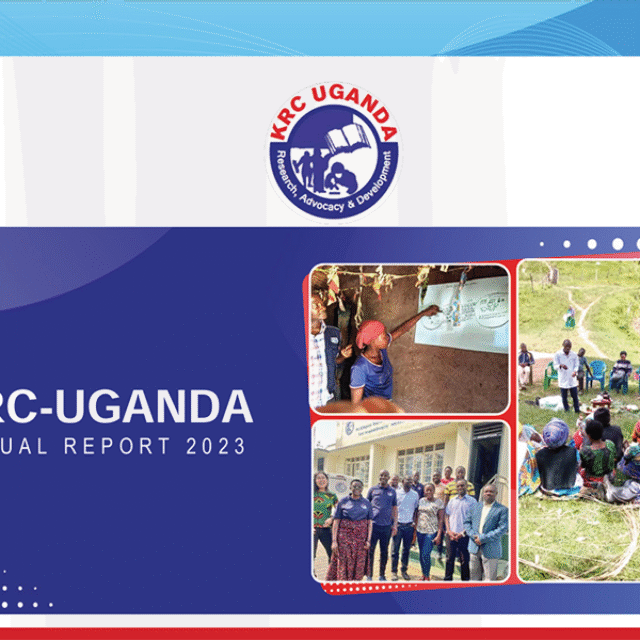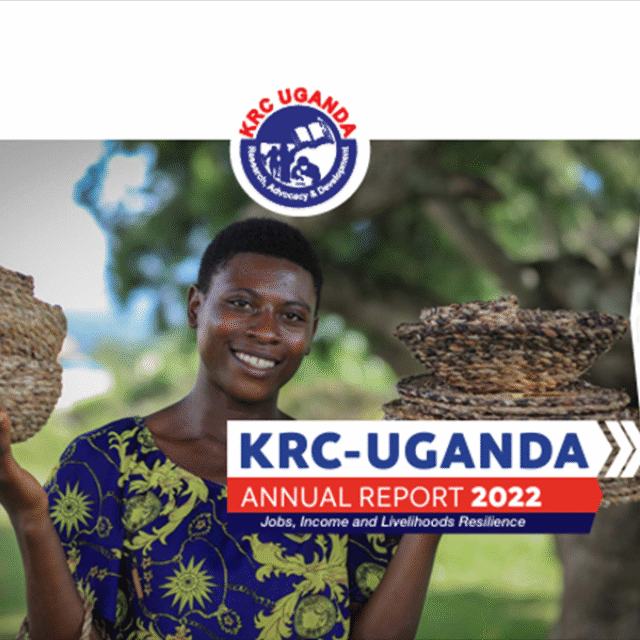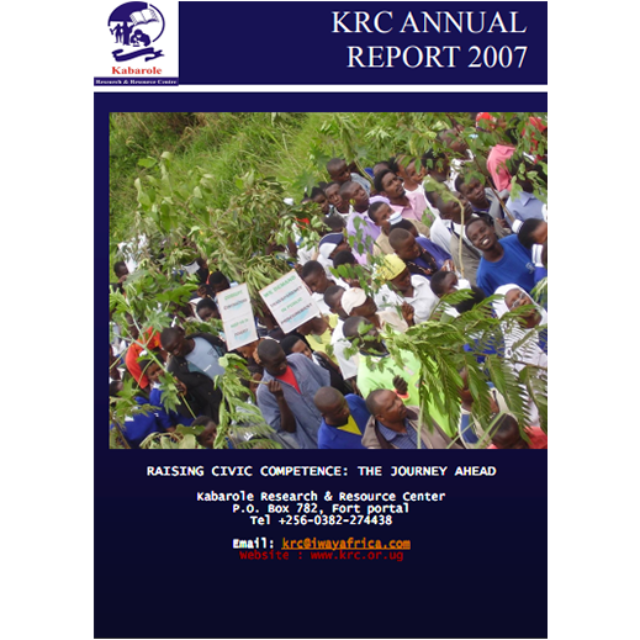… click to read Annual Report
Annual Reports

Mid Term Evaluation Report 2024
This report highlights the findings of the mid-term evaluation for the Advancing PeacefulCo-Existence and Respect for Human Rights among Refugees and Host Communities inNorthern Uganda Project. It points out the general context in which the project is beingimplemented, the status of progress towards achieving the desired outcomes, lessons learnt,challenges and recommendations for improvement in the remaining project period.This mid-term evaluation had two forms of scope namely; the physical/geographical coverageand the thematic area of area of coverage. Geographically, the study was conducted in Yumbedistrict – specifically Bidi Bidi refugee settlement in Yangani and Abirimajo Zones, Teregoand Madi-Okollo districts in Omugo 1, 2, 3, 4, 5, 6 and Arianze 1 & 2, Odobu 1&2 for Rhinocamp and, Lamwo District – Palabec settlements, zones 8, 5A, 5B, &7. Demographically theproject targets Citizens/refugees and Host communities, Paralegals/Community Peacekeepers, Elders/women leaders/RWCs/LC leaders, OPM/Police/UNHCR/Protection partners,duty bearers who include technical and political leaders at sub county level including RWCs.The evaluation aimed to achieve 11 objectives which included; the review of the contextualanalysis and baseline report/ data to examine the extent to which project outcomes have beenachieved, examine the extent to which project interventions have contributed to projectoutcomes, examine the appropriateness and relevance of the approaches used to deliverproject results, examine the project assumptions, risks and challenges and the extent to whichthey affected the project outcomes, document key insights and lessons and how they caninform future programming, review the relevance of the theory of change for the project,assess the level of collaboration with other partners and its relevancy to achievement ofproject results, suggest practical recommendations in relation to approaches and interventionsthat can contribute to achievement of Project outcomes.From the midterm evaluation, a snapshot of the findings indicated hereunder presents thatthere is increased knowledge on legal, human rights, peace, resiliency and response topsychosocial stress particularly among the paralegals as compared to the refugees and hostcommunities where 50% of the refugees and host communities reported relative peace andreduced violence at community from 35% at baseline. However, little attention was given tothe psychological aspects/effects of violence and human rights violations in the design andimplementation.There are more documented cases by the paralegals in the refugees’ settlements than therewas before commencement of the project with 21.1% at baseline and 25.1% at midterm of thebeneficiary’s sought justice for any forms of human rights abuses.There is increased access & use of mediation & local/traditional conflict resolution strategiesfor community-based since there more cases that are settled though family courts and elder’scouncils than those addressed through litigation with 80% of project beneficiariesacknowledged to having their cases resolved through mediation and other alternative disputeresolution mechanisms in the host and refugee communities at mid-term.Findings revealing that 37.9% of beneficiary at midterm acknowledged in participation inleadership, decision making and policy development against a baseline of 16.5%. …click to read full report

Annual Report 2023
I am honoured to share with you our annual report for 2023, showcasing our accomplishments and progress in advancing sustainable development in our communities. Despite challenges, we achieved significant milestones across various programs. Our Food Security andAgribusiness (FAGRIB) Unit recorded an average annual performance of 82% and female participation in all FAGRIB projects increased to 55%, surpassing our target of 40%. We saw tangible improvements in food security and dietary diversity among target households. Food security increased by 34%, from 50% in 2022 to 84% in 2023, and dietary diversity improved by 134%. These achievements have positively impacted the health and nutrition of our beneficiaries. Our support for SACCOs through training in Savings and Credit Policies and Procedures and Business Planning for SACCO Leaders has equipped them with essential knowledge and skills for effective management and formal registration. We registered success under youth empowerement programs with 27% of them accessing decent incomes through employment opportunities and increased participation in agricultural market systems. Additionally, our initiatives have enhanced access to mediation and local conflict resolution strategies, contributing to improved community-based resource conflict resolution. In environmental sustainability, constructing institutional stoves has significantly reduced fuel use and kitchen smoke, benefiting women’s health and children’s education. We also made progress in building storage structures, solar driers, briquette machine sets, and kilns. I express my sincere appreciation to the entitre Board, donors and Partners for your guidance and support throughout the year. Our achievements would not have been possible without your strategic direction and unwavering commitment to our mission. I look forward to our continued collaboration as we work towards even greater impact in the years ahead.Have a wonderful reading time Beatrice Birungi Kiraso,Board Chairperson Click to read the report

Annual Report 2022
Our dear partners, our peers in the civil society with whom we serve and all those we serve,I am delighted to present to you our 2022 annual report. This year was remarkable on the timelineof our 20222-2026 strategic plan, when we took the first step in its execution. The tagline of ournew strategy is “Jobs, Income and Livelihoods Resilience”, which heralds our reinvigoratedcommitment to our mission. Thank you, our partners for supporting this strategy. Another remarkable triumph was about the resilience and recovery from the COVID-19 socioeconomic shock and we are grateful to all our strategic partners, both old and new ones whoembraced KRC-Uganda’s philosophy and mission. This report is a summary of our operations in 2022;I invite you to catch a glimpse of our methods and our successes across the program areas of governance and policy advocacy, food security and agribusiness, environment and energy, information, research and communication. Let me shed light on the following key areas. From the global discourse on food systems, to our contextual focus on local food systems, KRC Uganda is spearheading awareness and advocacy campaigns on food safety as well as imparting skills onto smallholder farmers to drive a positive agroecological transition through our farm advisorysystems. In the civic spaces, we are building the capacity of young people to meaningfully engage in agriculture, finance sector, and governance while we harness their youthful demographic dividend. Our focus in the energy sector in partnership with the Office of the Prime Minister in Uganda (OPM) is at the core of gender inclusion especially for women in the refugee and host communities whom we support to meet both their practical and strategic gender needs. We are at the forefront of promoting peace and human rights amongst conflict inflicted persons in Northern Uganda, and we are putting in place social infrastructure to prevent and manage conflict.With these and many other initiatives, I hope you will appreciate your contribution to our missionas well as find another window of opportunity for collaboration in the future. On behalf of the board ofdirectors, the board of trustees, management and staff I extend our appreciation to our partners forcontinually supporting the work of this organization. Welcome to our annual report for 2022. Beatrice Birungi KirasoBoard Chairperson KRC-Uganda Click to read the report
Annual Report 2021
Annual Report 2020
… click to read Annual Report
Annual Report 2019
… click to read Annual Report
Annual Report 2018
… click to read Annual Report
Annual Report 2010
… click to read Annual Report
Annual Report 2009
… click to read Annual Report
Annual Report 2008
… click to read Annual Report
Annual Report 2007
… click to read Annual Report

